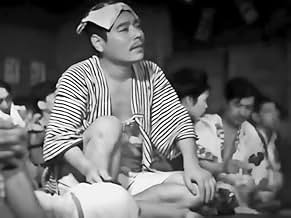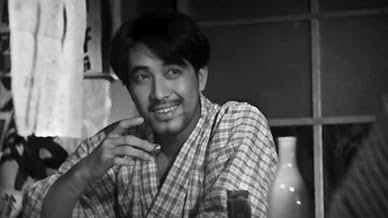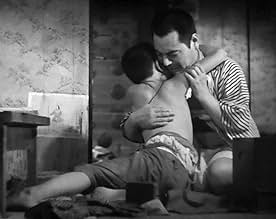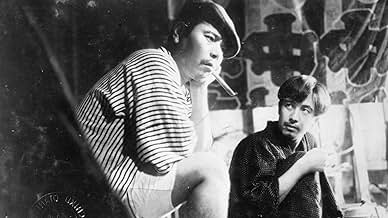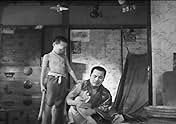VALUTAZIONE IMDb
7,2/10
1545
LA TUA VALUTAZIONE
Aggiungi una trama nella tua linguaTwo Tokyo co-workers come across a destitute young lady in search of a place to live.Two Tokyo co-workers come across a destitute young lady in search of a place to live.Two Tokyo co-workers come across a destitute young lady in search of a place to live.
- Premi
- 1 vittoria in totale
Den Ôhinata
- Jiro
- (as Den Obinata)
Tomio Aoki
- Tomio
- (as Tokkan Kozô)
Chishû Ryû
- Man on boat
- (non citato nei titoli originali)
Hideo Sugawara
- Boy Taunting Tomio
- (non citato nei titoli originali)
Recensioni in evidenza
"Passing fancy" (1933) is the latest of the three "silent Ozu's" that I have watched recently (the others were "Tokyo chorus" (1931) and "I was born ... but" (1932)) and the most recent one. Despite the coming of sound Ozu still adheres (just like Chaplin) firmly to the silent tradition. In his view silent film was on his way to reaching perfection and this was threatened by the still infant and imperfect sound technology. "Passing fancy" has many slapstick elements. See for example how characters in this film scratch their buttocks to express uncertainty and discomfort.
"Passing fancy" is of al three silent Ozu's the one with the most contrast to his later oeuvre.
It is about a young son and an adult father in stead of about an adult son and elderly parents. The father is single. The father is working class and not middle class.
Apart from the father-son relationsship there is also a love triangle in this film. In his favourite pub one night there appears a young lady. The father inmediately falls for her charms, but his younger colleague does not trust the lady. Of course the lady herself prefers the younger colleague. The father does ridicule himself courting someone half his age and in the proces neglects his son. Halfway the film one wonders if the father is raising his son or the other way round.
At the end the father, who is pretty good in fooling himself, has ultimately to come to two conclusions. In the first place that he is too old for the young lady (who calls him "a nice uncle", at first much to his chagrin) and in the second place that he has been a lousy father.
Takashi Sakamoto plays the somewhat naive and not very clever father in such a sympathetic way that the next year he returned as the main charecter in Ozu's real breakthrough film "A story of floating weeds".
"Passing fancy" is of al three silent Ozu's the one with the most contrast to his later oeuvre.
It is about a young son and an adult father in stead of about an adult son and elderly parents. The father is single. The father is working class and not middle class.
Apart from the father-son relationsship there is also a love triangle in this film. In his favourite pub one night there appears a young lady. The father inmediately falls for her charms, but his younger colleague does not trust the lady. Of course the lady herself prefers the younger colleague. The father does ridicule himself courting someone half his age and in the proces neglects his son. Halfway the film one wonders if the father is raising his son or the other way round.
At the end the father, who is pretty good in fooling himself, has ultimately to come to two conclusions. In the first place that he is too old for the young lady (who calls him "a nice uncle", at first much to his chagrin) and in the second place that he has been a lousy father.
Takashi Sakamoto plays the somewhat naive and not very clever father in such a sympathetic way that the next year he returned as the main charecter in Ozu's real breakthrough film "A story of floating weeds".
10kerpan
Dekigokoro (Passing Fancy), is one of Ozu's 3 masterpieces from 1933. It stars the second of cinematic Ozu's "alter egos", Takeshi Sakamoto. Sakamoto typically plays a down and out working class father. Here, he is especially dense, to excellent comic effect. Tomio Aoki (in probably his most significant child role) plays a kid who seems to be considerably brighter than his father -- and who does more to keep the household running. Aoki is (of course) quite funny. But he also does an excellent job of showing a child's response to unwanted change. He and his father have long depended solely on each other -- but now his father has his eye on a young woman who has moved into their slum neighborhood. Aoki very much resents his father's interest in the woman -- and resists her attempts to win his affections.
This is an extremely visual film, with lots of completely "wordless" humor. The film starts out with an extended scene in a music hall (Chishu Ryu performing as the "singer") in which first a lost wallet circulates, and then a flea (or fleas). Probably not as great a family drama as the prior "I Was Born But" or the subsequent "Tokyo Inn", but nonetheless quite enjoyable.
This is an extremely visual film, with lots of completely "wordless" humor. The film starts out with an extended scene in a music hall (Chishu Ryu performing as the "singer") in which first a lost wallet circulates, and then a flea (or fleas). Probably not as great a family drama as the prior "I Was Born But" or the subsequent "Tokyo Inn", but nonetheless quite enjoyable.
Yasujiro Ozu is an extremely well respected film director. While not as famous today as his countryman, Kurosawa, among those who are fans of Japanese cinema, he is practically a god. While I have loved many of his films due to their amazing artistry and great direction, I also think that overall, many of his films are a tad overrated. In other words, because SOME films are near-perfect classics (such as both versions of FLOATING WEEDS or my favorite, LATE SPRING), people often tend to see ALL of his films as having the same quality. This is true of all the great directors, as there are a devoted group of followers that see every film as great--even if the films have obvious flaws or were made before the directors learned and perfected their craft.
I mention all this because although PASSING FANCY is a very good film, it's far from great--despite some amazingly positive reviews. While it's true that the Japanese film industry didn't switch to sound until very, very late compared to Western countries, shouldn't this be considered when giving out 10s to these silents? In other words, shouldn't technical merit be considered when reviewing a film? As such, I'd have to knock a point off the film. In addition, the film's plot is amazingly scant and a bit too ordinary.
Now in Ozu's defense, I must say that when it comes to the ordinary, nobody does it better. Here we have the story of a hard-drinking blue collar man and his young son and there's not a lot of excitement or action...but it STILL engages the audience due to his nice touch and excellent acting. In addition, the ending is very sweet and well done--even if nothing is exactly resolved in this story of very mundane individuals.
Well done and worth seeing but not exactly magical.
I mention all this because although PASSING FANCY is a very good film, it's far from great--despite some amazingly positive reviews. While it's true that the Japanese film industry didn't switch to sound until very, very late compared to Western countries, shouldn't this be considered when giving out 10s to these silents? In other words, shouldn't technical merit be considered when reviewing a film? As such, I'd have to knock a point off the film. In addition, the film's plot is amazingly scant and a bit too ordinary.
Now in Ozu's defense, I must say that when it comes to the ordinary, nobody does it better. Here we have the story of a hard-drinking blue collar man and his young son and there's not a lot of excitement or action...but it STILL engages the audience due to his nice touch and excellent acting. In addition, the ending is very sweet and well done--even if nothing is exactly resolved in this story of very mundane individuals.
Well done and worth seeing but not exactly magical.
Ozu tricked me on this one. I read nothing about it before it started, and as the opening act played out, I thought I was getting a romance. Instead, it ended up being a story about a father and his son, a melodrama that effectively works within its box while peeking out beyond its borders to work quite well. It made me think of Woman of Tokyo, the melodrama that simply went too far in my eyes, and it acted as a contrast to something that kept things sedate enough to work more effectively.
Kihachi (Takeshi Sakamoto) and Jiro (Den Obinata) are coworkers in a brewery. Kihachi is illiterate but has a son, Tomio (Tokkan Kozo), who goes to school. After drinking one night, the two men encounter Harue (Nobuko Fushimi), a young woman in need whom they bring to their drinking spot, run by Otome (Chuoko Iida), who gives Harue a job. The opening of the film is about the dueling affections for Harue with Kihachi bending over backwards to make himself palatable to her while the younger Jiro treats her dismissively. The film actually begins with a quote about geishas being both givers and receivers of temporary affection, something I think could have come from Jiro's perspective. There's this distance because he sees her as just selling herself for temporary room and board. It comes back later as well.
But, Kihachi's efforts get rebuffed, and he's angry about it. Partially taking it out on Tomio, Kihachi, in a conversation with Otome, realizes his error and decides to give Tomio a bit of cash to spend on himself, to make himself feel like a millionaire for an afternoon. And this is where the film finds its focus: on the father and son.
Tomio gets sick with some bad candy, to the point of near death, and Kihachi has to face what he actually cherishes. This section takes up a lot of time in the middle of the film, to the point of being most of the rest of the film, and it's done in that typical Ozu way: quiet and heavily reliant on people looking at each other. Kihachi anguishes over Tomio, exchanging little jokes back and forth when he's conscious, and receiving sympathy and whatever help he can get from those around him, mostly Jiro and Harue.
It's these quiet moments that really make Ozu films. He can fill the openings with light comedy of different stripes, to the point where the opening almost feels like a Lubitsch film, but he's always going to return to what obviously came natural to him: the soft, quiet family drama. And this is where the comparison to Woman of Tokyo becomes the most apt, or contrast, I should say. In the earlier film, it's about a character's death and everyone cries obviously and bigly. Here, Tomio gets close to death, and everyone's sedate and reserved in the face of it. It's the stuff of melodrama (a dying child), but it's treated with so much more tact that it ends up working.
And the finale is about making hard choices in the face of a changing circumstances. Jiro took out a large loan to pay for the doctor, and Jiro is going to go work as a laborer in a remote region to pay it back. Can Kihachi just accept that? Can he accept that his son was saved by someone else?
I would applaud the film more for its ending, but it ends up having its cake and eating it at the same time to the point where I don't get the ending. The emotion of the last hour of the film is clear and effective, but then the ending finds a victory that doesn't quite fit. It limits my enjoyment of the melodrama a bit.
But not enough to undo the rest. I feel like the opening is a bit of a sleight of hand, but it's a good trick on Ozu's part (as well as his writer Tadao Ikeda) to establish characters, setting, and a motif that comes back later, giving greater import to a minor characters' actions. It's quite solid storytelling, combining early comedy with later drama. I just wish the ending more fit the film. But, the character of Kihachi apparently became something of a staple for Shochiku Studios as a recurring character. So, even in the 30s, Japanese cinema wasn't afraid of sequels.
Kihachi (Takeshi Sakamoto) and Jiro (Den Obinata) are coworkers in a brewery. Kihachi is illiterate but has a son, Tomio (Tokkan Kozo), who goes to school. After drinking one night, the two men encounter Harue (Nobuko Fushimi), a young woman in need whom they bring to their drinking spot, run by Otome (Chuoko Iida), who gives Harue a job. The opening of the film is about the dueling affections for Harue with Kihachi bending over backwards to make himself palatable to her while the younger Jiro treats her dismissively. The film actually begins with a quote about geishas being both givers and receivers of temporary affection, something I think could have come from Jiro's perspective. There's this distance because he sees her as just selling herself for temporary room and board. It comes back later as well.
But, Kihachi's efforts get rebuffed, and he's angry about it. Partially taking it out on Tomio, Kihachi, in a conversation with Otome, realizes his error and decides to give Tomio a bit of cash to spend on himself, to make himself feel like a millionaire for an afternoon. And this is where the film finds its focus: on the father and son.
Tomio gets sick with some bad candy, to the point of near death, and Kihachi has to face what he actually cherishes. This section takes up a lot of time in the middle of the film, to the point of being most of the rest of the film, and it's done in that typical Ozu way: quiet and heavily reliant on people looking at each other. Kihachi anguishes over Tomio, exchanging little jokes back and forth when he's conscious, and receiving sympathy and whatever help he can get from those around him, mostly Jiro and Harue.
It's these quiet moments that really make Ozu films. He can fill the openings with light comedy of different stripes, to the point where the opening almost feels like a Lubitsch film, but he's always going to return to what obviously came natural to him: the soft, quiet family drama. And this is where the comparison to Woman of Tokyo becomes the most apt, or contrast, I should say. In the earlier film, it's about a character's death and everyone cries obviously and bigly. Here, Tomio gets close to death, and everyone's sedate and reserved in the face of it. It's the stuff of melodrama (a dying child), but it's treated with so much more tact that it ends up working.
And the finale is about making hard choices in the face of a changing circumstances. Jiro took out a large loan to pay for the doctor, and Jiro is going to go work as a laborer in a remote region to pay it back. Can Kihachi just accept that? Can he accept that his son was saved by someone else?
I would applaud the film more for its ending, but it ends up having its cake and eating it at the same time to the point where I don't get the ending. The emotion of the last hour of the film is clear and effective, but then the ending finds a victory that doesn't quite fit. It limits my enjoyment of the melodrama a bit.
But not enough to undo the rest. I feel like the opening is a bit of a sleight of hand, but it's a good trick on Ozu's part (as well as his writer Tadao Ikeda) to establish characters, setting, and a motif that comes back later, giving greater import to a minor characters' actions. It's quite solid storytelling, combining early comedy with later drama. I just wish the ending more fit the film. But, the character of Kihachi apparently became something of a staple for Shochiku Studios as a recurring character. So, even in the 30s, Japanese cinema wasn't afraid of sequels.
Ozu has often used the theme of father and son relationships in his films and here he explores a little more besides. Beyond the relationship of Kihachi the father and Tomio the young son you get the widower Kihachi trying to become closer to the pretty, much younger Harue. This silent film speaks volumes about family, about hopes but it is Ozu's light comic touch which makes it another great film of his. It is completely silent but it is compelling, actually a story that could be retold and remade in any corner of the globe. The acting is just about universally good and the film has a lot of heart attached to its sometimes ordinary theme. Then again, Ozu has always made extraordinary out of the ordinary. Here is another example of the master at work.
Lo sapevi?
- QuizYasujirô Ozu regular Chishû Ryû has a small role towards the end of the film as a fellow passenger on board a ship, playing an uncredited "Man on Boat".
- BlooperKihachi states that 50 sen to a boy his age (referring to Tomio) is like 10 ryo to him and Otome. The ryo was replaced by the yen in 1871, over 60 years earlier. (The yen replaced the ryo at par; there are 100 sen to the yen.)
However, Otome then says, "No, more like 1,000 yen!" So, it's possible "ryo" was still being used synonymously with "yen" over a half-century later.
- ConnessioniFeatured in Transcendental Style and Flatulence (2017)
I più visti
Accedi per valutare e creare un elenco di titoli salvati per ottenere consigli personalizzati
Dettagli
- Tempo di esecuzione1 ora 40 minuti
- Colore
- Mix di suoni
- Proporzioni
- 1.37 : 1
Contribuisci a questa pagina
Suggerisci una modifica o aggiungi i contenuti mancanti

Divario superiore
By what name was Capriccio passeggero (1933) officially released in Canada in English?
Rispondi
